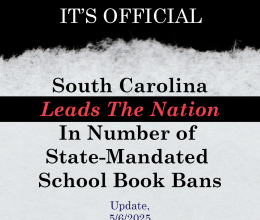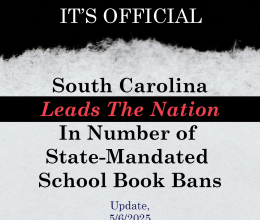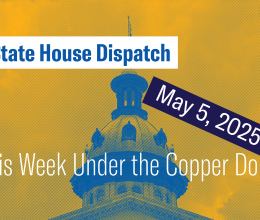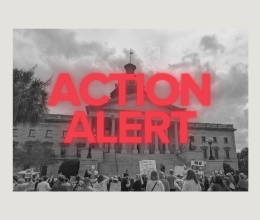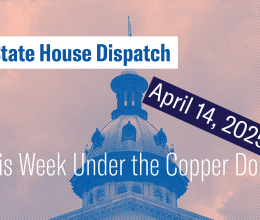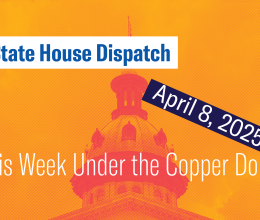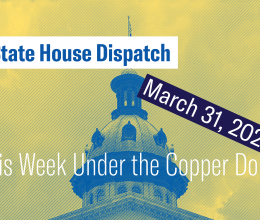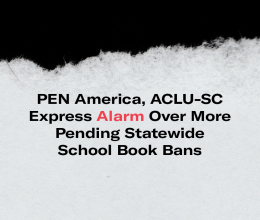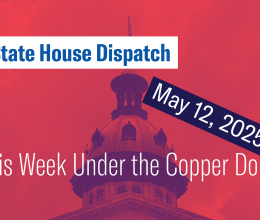
The following blog post is adapted from a keynote address I delivered on September 18 during Constitution Week at the University of South Carolina – Aiken. The topic was South Carolina constitutional issues and the ACLU of South Carolina’s role in preserving civil liberties.
I grew up coming to Aiken, South Carolina quite often at least for about a year.
My hometown of Easley, South Carolina is just up the road a couple of hours. But I was here an awful lot because my first serious girlfriend lived here.
I was up and down the road constantly — sometimes with my parents’ permission, sometimes not. I had my driver’s license — and my first car, a 1993 white Toyota Camry — and I hit the road.
I was pulled over about 4 times in a year for speeding, but otherwise, I was mostly safe.
The girlfriend and I had a melodramatic, long-distance, high school romance that lasted for about a year until it ended in a blaze of glory. She dumped me for an older guy.
You might wonder how I met that girlfriend, given that we lived miles apart. We met at church camp.
We both grew up in the Episcopal church, a Protestant Christian denomination close enough to the Catholic Church that they still serve wine on Sunday mornings during the service.
As young people in the church, we were invited to participate in youth leadership programs. Those programs brought us to Camp Gravatt, a retreat center and camp not far from here.
That’s where I met her. Her mom actually introduced us, thinking I’d be a good influence.
I mostly was, except for the speeding. In fact, I was elected president of the statewide youth group. I was honored for my leadership in this community of faith.
I had a lot of faith. I pored over the Bible and attended the before-school club for Christians. I started college at a conservative Christian school, and I considered seminary.
For many years, I never questioned my faith or Christianity and its influence in the world. Why would I?
I was in college when that all changed. I was reading and experiencing so many new things, and because of a history course, I finally took the time to read the United States Constitution and the Bill of Rights.
Because of where I was in my own personal journey, one part hit me harder than anything else:
Congress shall make no law respecting an establishment of religion, or prohibiting the free exercise thereof.
The first two clauses of the First Amendment proclaim religious liberty. At that moment in my life, I needed to be liberated from religion.
I was studying at my small college, majoring in Christian Theology. I was surrounded by others who shared a deep faith, and I was taught by brilliant professors. I thought I had my future all figured out.
Until I came out.
I am a transgender person. As my 8-year-old puts it, I was born with a girl body but a boy brain, a boy heart, and a boy soul.
LGBTQ people like me weren’t welcome at my small Christian college, certainly not in the Christian Theology department.
My professor and academic advisor told me to repent. My friends invited me to meet with their pastors. I worried that my academic scholarship, which contained requirements about my character, would be in jeopardy.
I needed religious liberty. So I left that private school, and I found my way to USC in Columbia and into the embrace of the First Amendment.
The First Amendment and its opponents
During my time at USC and in the years after, following some bumps in the road, I eventually found my path in life.
I didn’t become a pastor or an English professor. I became a civil rights leader.
As the Executive Director of the American Civil Liberties Union of South Carolina, it’s my job to advance and defend the civil rights and civil liberties of South Carolinians.
That includes protecting religious liberty.
Congress shall make no law respecting an establishment of religion, or prohibiting the free exercise thereof.
You should hear in that text two complementary protections:
- The guarantee that the government does not prefer religion over non-religion and does not favor one faith over others. This is commonly called the Establishment Clause because it prohibits the government from establishing an official religion of the United States.
- The right to religious belief and expression. This is commonly called the Free Exercise Clause because it gives us the right to exercise our faith or not.
These dual protections are supposed to work hand in hand, allowing religious liberty to thrive and safeguarding both religion and government from the influences of the other.
Today we are facing an attack on religious liberty, and the free exercise of religion is exponentially eroding the establishment clause.
This attack is from Christian nationalists.
I want to be clear about my language here: This attack is from a small but growing group of extremists that is distinct from Christians.
Most Christians believe strongly in religious freedom, as do Americans of all faiths and no faith.
That’s not what Christian nationalism is. There are three core components of Christian nationalism.
The first component of Christian nationalism is belief in a Christian nation.
According to Christianity Today,
Christian nationalism is the belief that the American nation is defined by Christianity, and that the government should take active steps to keep it that way. Christian nationalists assert that America is and must remain a “Christian nation.”
This is a dangerous idea that plays fast and loose with our history.
If the founders wanted an officially Christian nation, that concept would appear in the Constitution.
The question was debated. Some delegates to the Constitutional Convention argued for formal recognition of Christianity in the Constitution.
But ultimately, the framers did not adopt that view.
Instead, there are no mentions of Christianity in the Constitution, and religion is mentioned only 3 times: to prohibit attempts to establish a national religion, to prohibit infringing upon the free exercise of religion, and to prohibit religious tests in order to hold public office.
It’s clear that the country was not founded as officially Christian. But that’s a core belief of Christian nationalists.
The second component of Christian nationalism: a political ideology that believes Christianity should have primacy in the public square in order to address so-called immorality.
Christian nationalists do not call themselves by that name and do not work from a shared playbook. But the kind of policies that they espouse tell a clear story:
- Reinstating prayer in public schools
- Changing school curriculum to include Biblical education
- Banning books from libraries
- Pushing for anti-immigrant policies that aim to stop demographic changes
- Discriminating against LGBTQ people, and more
Much of their advocacy for these policies is characterized by a fervent belief that Christians are being persecuted when they should be elevated.
This fear of persecution has led to violence, including the insurrection at the US Capitol on January 6, 2021.
The third component of Christian nationalism: it rejects religious freedom for a distortion of both the Christian faith and America’s constitutional democracy.
Amanda Tyler of the Baptist Joint Committee for Religious Liberty said:
I believe that the single biggest threat to religious freedom in the United States today is Christian nationalism. Christian nationalism is antithetical to the constitutional ideal that belonging in American society is not predicated on what faith one practices or whether someone is religious at all.
Religious pluralism is vital to our democracy. The framers of the Constitution knew that, and most Americans today know it too.
Without it, we throw open the door and toss out the welcome mat to anti-Muslim bigotry, anti-Semitism, and second-class citizenship of those who have no faith at all.
When we put these three components together, it’s a scary combination.
I know some of you are thinking this sounds pretty far-fetched. Not a big deal. Not really something to worry about.
Because we’re supposed to have guardrails in place to stop this kind of extremism from causing harm to our country. Right?
Unfortunately, the guardrails aren’t working like they used to. We only have to look to recent decisions by the United States Supreme Court to see why.
Private schools, public funds
Let’s look first at Carson v. Makin, a case out of Maine.
In Maine, school districts without public secondary schools are allowed to pay private school tuition for students.
So if you live in an area of Maine without a public high school, your school district pays your private school tuition so you can get an education.
Maine law prohibits paying for religious instruction because the Establishment Clause separating church and state doesn’t allow public dollars to be spent on religious education.
At least that’s what they thought. And it makes sense that they’d think that.
James Madison, the principal author of the First Amendment, explicitly warned against taxpayer funding of religion, including religious education, because it would be the first step in allowing the government to force citizens to conform to the preferred faith of those in power.
Maine’s law was challenged by 3 families that wanted to use public dollars to send their kids to religious schools. They said that Maine’s law violated the Free Exercise Clause.
The case went to the US Supreme Court, which ruled that a state must fund religious activity as part of an educational aid program.
For decades, the court rejected efforts to direct government funds to religious uses. In Carson, however, six justices disregarded these longstanding, historical church-state concerns.
According to the court, state funding of religious indoctrination is not only permissible, but now required in some circumstances.
The Carson majority firmly placed the free-exercise rights of the Christian plaintiffs over the Establishment Clause rights of the broader populace.
Coercive prayer
Next, let’s look at Kennedy v. Bremerton School District, a case out of Washington.
Kennedy is a football coach at a public high school, and he is also a Christian. After each game, he prayed aloud on the 50-yard-line surrounded by his players.
In moments like this, students have to choose between participating in a teacher-led prayer, protesting that prayer, or avoiding it.
So the district asked Kennedy to stop praying with his students while on duty and offered him alternatives that would have allowed him to pray without religiously coercing students.
Instead, the coach kept praying with his students and sued, claiming that his free exercise rights were being violated.
The Court ignored well-established precedent that prohibits school officials from participating in prayer with students, and they ruled for the coach.
For over a half-century, the Court had recognized this kind of behavior as coercive and unconstitutional.
In Kennedy, they changed their minds and again prioritized the Free Exercise Clause over the Establishment Clause.
Those two clauses that are supposed to work hand in hand. But Justice Sonia Sotomayor said that these rulings lead us “to a place where separation of church and state becomes a constitutional violation.”
Now I’m not saying that the plaintiffs in these cases are Christian nationalists, but I am saying that we need to take a step back and look at the bigger picture.
Strongarming our schools
We have a growing movement that threatens our democracy through the erosion of religious liberty, and we have a Supreme Court that is shifting the long-established balance between the Establishment Clause and the Free Exercise Clause.
At the center of it all is our public schools. There is an effort across this state and across this nation to bring religion into our public schools.
We’ve seen this threat manifest in two primary ways:
- Government funding of religious instruction; and
- Censorship of curriculum and materials that don’t align with Christian nationalist ideology.
Let’s dig into both — first, government funding of religious instruction.
The Carson decision opens the door to government funding of religious schools, and earlier this year, South Carolina walked through that door.
The state legislature passed a law that creates a voucher program that will move state dollars into private schools, including religious schools. 1
That means the tax dollars of South Carolinians will pay for religious education, primarily Christian education since the state doesn’t have many Jewish or Muslim or Buddhist schools.
Before the creation of this voucher program, it wasn’t like Christian education wasn’t already available. It was.
Our state’s largest school districts allow families to opt in to off-campus Christian education programs that happen during the school day.
In addition to Christian clubs before and after school, these programs allow churches and organizations to transport students off-campus for religious instruction.
These programs operate during the school day, and students miss school time to participate.
These programs aren’t funded by tax dollars, and families have to opt in so they don’t run afoul of the separation of church and state.
But what’s important here is that this wasn’t enough. Taking students out of school for optional religious education that wasn’t funded with government dollars wasn’t enough.
The goal is for public dollars to pay for religious education, erasing the separation of church and state.
And if what we’ve seen happen already is any indication, the ultimate goal could be for the government to fund religious activities more generally.
Such a goal certainly aligns with the Christian nationalist ideas that the United States is and should be a Christian nation.
The second threat to the separation of church and state in public education is censorship.
Remember that a core component of Christian nationalism is a desire for Christian morality to drive policy.
This ideology is held overwhelmingly by white Americans, so it tends to exacerbate racial and ethnic differences.
And what we’re seeing is an attempt to whitewash American history and erase LGBTQ people from public life.
You’ve undoubtedly heard about critical race theory (CRT) and attempts to ban it. Let’s unpack that a bit.
Critical race theory is taught in law school to students attempting to analyze how laws, movements, and media are shaped by race and ethnicity. It’s pretty sophisticated stuff, and it isn’t taught in our public elementary, middle, and high schools.
But we have still seen efforts to ban it. And what’s happened since CRT isn’t actually taught, but is banned? Educators have no idea what’s allowed.
History teachers aren’t sure how to cover slavery. English teachers are being told to remove from their curriculum books by Black authors about the Black experience. Librarians are being told to pull books from shelves.
Mary Wood’s story
Take for example Mary Wood, an English teacher at Chapin High School. She assigned Ta-Nehisi Coates’ Between the World and Me, a nonfiction book about the Black experience in the United States. It was part of a lesson plan on research and argumentation in her Advanced Placement class.
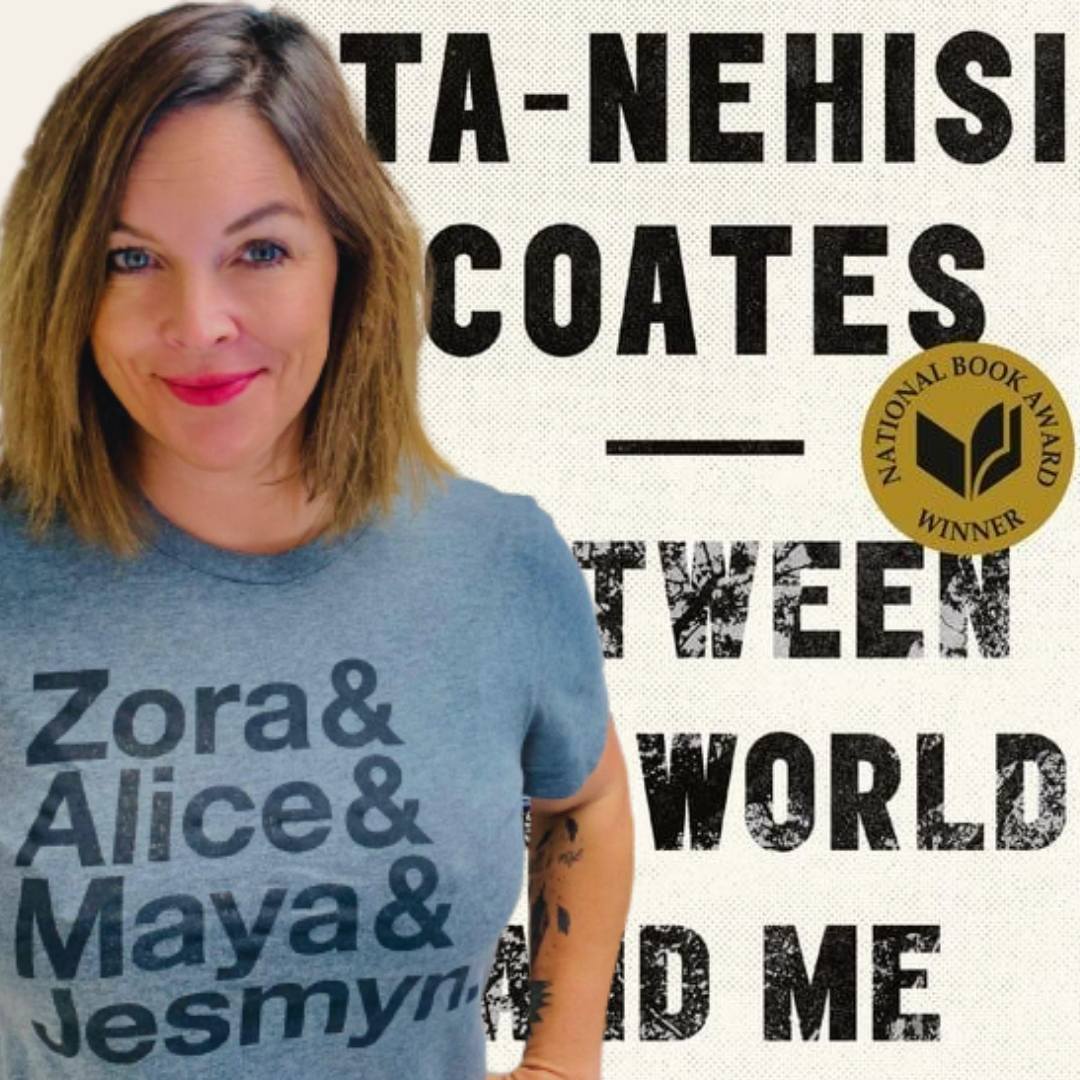
Read our Q&A with Mary Wood here

Between the World and Me was published in 2015 as an open letter by Coates to his son, reflecting on currents of hope and despair in the struggle for racial justice in the United States.
It won the National Book Award for Nonfiction, whose judges said, “Incorporating history and personal memoir, Coates has succeeded in creating an essential text for any thinking American today.”
Coates’ book has been the target of censorship campaigns across the country where Christian nationalists and organizations like Moms for Liberty are targeting books by and about people of color.
Mary Wood thought she was teaching her AP students how to craft arguments themselves and analyze arguments from others.
But some of her white students said that what they were reading made them uncomfortable, and they told their parents.
The district ordered Mary to remove the book from her curriculum, and she almost lost her job.
Let’s sit with that for a minute. A handful of white students were uncomfortable reading about racial injustice, and as a result, a book is no longer available to be used in the entire district.
A small but vocal group of parents were able to decide what all kids read and learn – not just what their own kids read and learn. They were able to override the expertise and experience of educators in order to force their own views on an entire district.
I wish Mary’s story was unique. It isn’t.
In Pickens, the school district removed from curriculum and from libraries a book called Stamped: Racism, Antiracism, and You. (We are currently suing the Pickens County School District for this politically and racially motivated act of censorship.)
In school districts across the state – Beaufort County, Berkeley County, Horry County, and beyond – Christian nationalists and Moms for Liberty volunteers have requested the removal of more than 90 books from library shelves.
In the first half of the 2022-2023 school year, 30% of the titles banned were about race, racism, or featured characters of color, according to PEN America.
This censorship is specifically aimed at silencing the truthful teaching of America’s racial history and how it reverberates in our society today.
If we can’t teach Between the World and Me, can we teach about slavery, Jim Crow laws, or the Civil Rights Movement?
If a small number of parents gets to decide what’s appropriate, and not our trained experts, where are the lines? Where does it stop?
It isn’t only whitewashing that’s happening. The desire of Christian nationalists to enforce their morality through policy has led to attempts to erase LGBTQ people. Banning books written by LGBTQ authors or including LGBTQ characters is growing exponentially.
Christian nationalists call these books “age-inappropriate.” But appropriateness isn’t the same for all of us. What I consider appropriate may be very different from what you consider appropriate. That’s why we have librarians who are experts in curating materials that are age appropriate.
But organizations like Moms for Liberty don’t trust librarians. They want to choose what all kids read, not just their own kids.
Books are a window into new worlds. They offer a reflection of our own stories and a chance to see ourselves differently. They open up doorways to explore our history and to envision our future. By banning LGBTQ books, we are taking away the opportunity for LGBTQ kids to see themselves reflected. We are taking away the opportunity for all kids to understand other people’s lived experiences.
This censorship is unconstitutional. The First Amendment guarantees all of us the right to share ideas and gain knowledge, including students. But whether the Supreme Court will let the Free Exercise clause trample over the right to access information remains to be seen.
The Christian nationalist project
I want to be clear that what we’re seeing is all part of the same movement to make the United States the Christian nation that a vocal minority believes it should be.
And it starts with our schools. If they can use government funds to pay for Christian education, and if they can censor any content that doesn’t align with Christian nationalist ideology, they can change the next generation. They can ensure that generation doesn’t affirm religious freedom and instead espouses a Christian nationalist view of the world.
In the same way that I feel passionately about guarding religious liberty, they feel as passionately about undoing it.
But this isn’t inevitable. We can fight back.
The best way to combat Christian nationalism is to recommit to foundational ideas of religious freedom for all.
Christians Against Christian Nationalism tell us what they are:
- People of all faiths and none have the right and responsibility to engage constructively in the public square.
- One’s religious affiliation, or lack thereof, should be irrelevant to one’s standing in the civic community.
- Government should not prefer one religion over another or religion over nonreligion.
- Religious instruction is best left to our houses of worship and other religious institutions.
We can’t let Christian nationalists ignore our history and remake our future. I won’t.
And there are people of all faiths standing in the way of this dangerous movement. I hope you will stand in the way too.
I may not be a Christian anymore. But I will always appreciate the way faith calls so many to justice.
I may not be a Christian anymore. But I will stand up for religious liberty for Christians and for all faiths.
I may not be a Christian anymore. But I will always value the role that faith played in my childhood. At the very least, it introduced me to my wife.
That girlfriend from Aiken? We married 10 years later.
1 Six public school parents, the South Carolina State Conference of the NAACP, and The South Carolina Education Association have since filed a lawsuit challenging the school voucher program, arguing that it violates key protections in the South Carolina Constitution. You can read more about that here.

